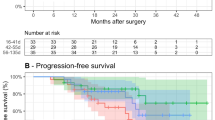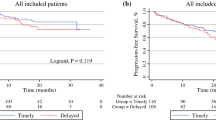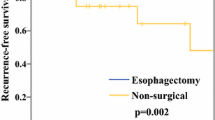Abstract
Background
The interval between preoperative chemoradiotherapy and surgery reportedly affects perioperative outcomes and survival; however, the optimal interval in esophageal cancer patients remains uncertain.
Objective
Our aim was to determine whether a prolonged interval between preoperative neoadjuvant chemoradiotherapy (NACRT) and esophagectomy affects the outcomes of esophageal cancer patients.
Methods
A total of 131 patients with esophageal cancer received curative surgery following NACRT at Akita University Hospital between 2009 and 2017. We divided these patients into two groups based on the median interval from NACRT to esophagectomy, and compared the rates of pathological complete response (pCR), surgical outcomes, and survival.
Results
The median interval from NACRT to esophagectomy was 39 days (range 21–95). Of the 131 patients, 70 (53%) received esophagectomy after 39 days or more from completion of NACRT. There were no significant differences in the clinicopathological features, including pCR rates, between the two groups. Prolongation of the interval from NACRT to esophagectomy was significantly associated with an increased rate of anastomotic leakage and recurrent laryngeal nerve palsy (p = 0.0225 and p = 0.0022, respectively); however, no association with overall survival was detected.
Conclusions
A prolonged interval between NACRT and esophagectomy had no impact on pCR rates or survival. However, delaying esophagectomy may increase the likelihood of surgical complications such as anastomotic leakage and recurrent laryngeal nerve palsy.

Similar content being viewed by others
References
Abnet CC, Arnold M, Wei WQ. Epidemiology of esophageal squamous cell carcinoma. Gastroenterology. 2018;154(2):360–73.
Ando N, Ozawa S, Kitagawa Y, Shinozawa Y, Kitajima M. Improvement in the results of surgical treatment of advanced squamous esophageal carcinoma during 15 consecutive years. Ann Surg. 2000;232(2):225–32.
Shitara K, Muro K. Chemoradiotherapy for treatment of esophageal cancer in Japan: current status and perspectives. Gastrointest Cancer Res. 2009;3(2):66–72.
Tachimori Y, Ozawa S, Numasaki H, et al. Registration Committee for Esophageal Cancer of the Japan Esophageal Society. Comprehensive registry of esophageal cancer in Japan, 2012. Esophagus. 2019;16(3):221–45.
Motoyama S, Sugiyama T, Ueno Y, et al. REG I expression predicts long-term survival among locally advanced thoracic squamous cell esophageal cancer patients treated with neoadjuvant chemoradiotherapy followed by esophagectomy. Ann Surg Oncol. 2006;13(12):1724–31.
Sato Y, Motoyama S, Saito H, Minamiya Y. Novel candidate biomarkers of chemoradiosensitivity in esophageal squamous cell carcinoma: a systematic review. Eur Surg Res. 2016;56(3–4):141–53.
Wong I, Law S. Surgery in the era of neoadjuvant therapy for cancer of the esophagus. Esophagus. 2016;13(2):105–109.
van Hagen P, Hulshof MC, van Lanschot JJ, et al.; CROSS Group. Preoperative chemoradiotherapy for esophageal or junctional cancer. N Engl J Med. 2012;366(22):2074–84.
Wijnhoven BP, van Lanschot JJ, Tilanus HW, Steyerberg EW, van der Gaast A. Neoadjuvant chemoradiotherapy for esophageal cancer: a review of meta-analyses. World J Surg. 2009;33(12):2606–14.
Tong DK, Law S, Kwong DL, Chan KW, Lam AK, Wong KH. Histological regression of squamous esophageal carcinoma assessed by percentage of residual viable cells after neoadjuvant chemoradiation is an important prognostic factor. Ann Surg Oncol. 2010;17(8):2184–92.
Koen Talsma A, Shapiro J, Looman CW, et al. Lymph node retrieval during esophagectomy with and without neoadjuvant chemoradiotherapy: prognostic and therapeutic impact on survival. Ann Surg. 2014;260(5):786–92.
Ando N, Kato H, Igaki H, et al. A randomized trial comparing postoperative adjuvant chemotherapy with cisplatin and 5-fluorouracil versus preoperative chemotherapy for localized advanced squamous cell carcinoma of the thoracic esophagus (JCOG9907). Ann Surg Oncol. 2012;19(1):68–74.
Sjoquist KM, Burmeister BH, Smithers BM, et al.; Australasian Gastro-Intestinal Trials Group. Survival after neoadjuvant chemotherapy or chemoradiotherapy for resectable oesophageal carcinoma: an updated meta-analysis. Lancet Oncol. 2011;12(7):681–92.
Delanian S, Lefaix JL. Current management for late normal tissue injury: radiation-induced fibrosis and necrosis. Semin Radiat Oncol. 2007;17(2):99–107.
Sobin LH, Gospodarowicz MK, Wittekind C (eds). TNM Classification of Malignant Tumours. International Union Against Cancer. 7th ed. Oxford: Wiley-Blackwell; 2009.
Clavien PA, Barkun J, de Oliveira ML, et al. The Clavien-Dindo classification of surgical complications: five-year experience. Ann Surg. 2009;250(2):187–96.
Japan Esophageal Society: Japanese Classification of Esophageal Cancer, 11th edition: part I. Esophagus. 2017;14(1):1–36.
Japan Esophageal Society: Japanese Classification of Esophageal Cancer, 11th edition: part II and III. Esophagus. 2017;14(1):37–65.
Francois Y, Nemoz CJ, Baulieux J, et al. Influence of the interval between preoperative radiation therapy and surgery on downstaging and on the rate of sphincter-sparing surgery for rectal cancer: the Lyon R90-01 randomized trial. J Clin Oncol. 1999;17(8):2396.
Zorcolo L, Rosman AS, Restivo A, et al. Complete pathologic response after combined modality treatment for rectal cancer and long-term survival: a meta-analysis. Ann Surg Oncol. 2012;19(9):2822–32.
Maas M, Nelemans PJ, Valentini V, et al. Long-term outcome in patients with a pathological complete response after chemoradiation for rectal cancer: a pooled analysis of individual patient data. Lancet Oncol. 2010;11(9):835–44.
Martin ST, Heneghan HM, Winter DC. Systematic review and meta-analysis of outcomes following pathological complete response to neoadjuvant chemoradiotherapy for rectal cancer. Br J Surg. 2012;99(7):918–28.
Kalady MF, de Campos-Lobato LF, Stocchi L, et al. Predictive factors of pathologic complete response after neoadjuvant chemoradiation for rectal cancer. Ann Surg. 2009;250(4):582–9.
Kim JY, Correa AM, Vaporciyan AA, et al. Does the timing of esophagectomy after chemoradiation affect outcome? Ann Thorac Surg. 2012;93(1):207–12; discussion 212–3.
Tessier W, Gronnier C, Messager M, et al. Does timing of surgical procedure after neoadjuvant chemoradiation affect outcomes in esophageal cancer? Ann Thorac Surg. 2014;97(4):1181–9.
Shaikh T, Ruth K, Scott WJ, et al. Increased time from neoadjuvant chemoradiation to surgery is associated with higher pathologic complete response rates in esophageal cancer. Ann Thorac Surg. 2015;99(1):270–6.
Chiu CH, Chao YK, Chang HK, et al. Interval between neoadjuvant chemoradiotherapy and surgery for esophageal squamous cell carcinoma: does delayed surgery impact outcome? Ann Surg Oncol. 2013;20(13):4245–51.
Munasinghe A, Markar SR, Mamidanna R, et al. Is It Time to Centralize High-risk Cancer Care in the United States? Comparison of Outcomes of Esophagectomy Between England and the United States. Ann Surg. 2015;262(1):79–85.
Nishigori T, Miyata H, Okabe H, et al. Impact of hospital volume on risk-adjusted mortality following oesophagectomy in Japan. Br J Surg. 2016;103(13):1880–1886.
Fuchs HF, Harnsberger CR, Broderick RC, et al. Mortality after esophagectomy is heavily impacted by center volume: retrospective analysis of the Nationwide Inpatient Sample. Surg Endosc. 2017;31(6):2491–97.
Markar SR, Mackenzie H, Askari A, Faiz O, Hanna GB. Effect of Esophageal Cancer Surgeon Volume on Management and Mortality from Emergency Upper Gastrointestinal Conditions: Population-based Cohort Study. Ann Surg. 2017;266(5):847–53.
Chang AC. Centralizing Esophagectomy to Improve Outcomes and Enhance Clinical Research: Invited Expert Review. Ann Thorac Surg. 2018;106(3):916–23.
Motoyama S, Yamamoto H, Miyata H, et al. Impact of certification status of the institute and surgeon on short-term outcomes after surgery for thoracic esophageal cancer: evaluation using data on 16,752 patients from the National Clinical Database in Japan. Esophagus. 2020;17(1):41–49.
Acknowledgements
This work was supported in part by Grants-in-Aid for Scientific Research from the Ministry of Education, Culture, Science, Sports and the Japan Science and Technology Agency.
Author information
Authors and Affiliations
Corresponding author
Ethics declarations
Disclosures
Akiyuki Wakita, Satoru Motoyama, Yusuke Sato, Yushi Nagaki, Hiromu Fujita, Kaori Terata, Kazuhiro Imai, and Yoshihiro Minamiya have no actual or potential conflicts of interest to disclose regarding this study.
Additional information
Publisher's Note
Springer Nature remains neutral with regard to jurisdictional claims in published maps and institutional affiliations.
Rights and permissions
About this article
Cite this article
Wakita, A., Motoyama, S., Sato, Y. et al. Verification of the Optimal Interval Before Esophagectomy After Preoperative Neoadjuvant Chemoradiotherapy for Locally Advanced Thoracic Esophageal Cancer. Ann Surg Oncol 28, 2101–2110 (2021). https://doi.org/10.1245/s10434-020-09206-x
Received:
Accepted:
Published:
Issue Date:
DOI: https://doi.org/10.1245/s10434-020-09206-x




